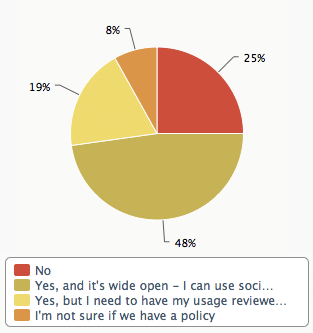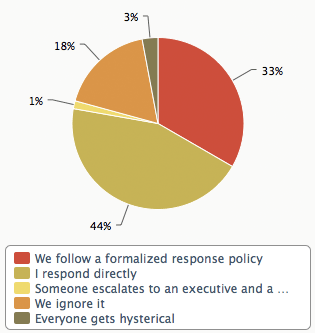Engaging and understanding the market is a critical set of activities that many marketers are presenting the results of their 2011 efforts to their management teams for 2012 plan finalization. The final end of the year push is always a fun time and finalizing your next year’s budget and plan are just some of the things we all have to do. For many, social media may be on the list of things to invest in for 2012. Whether it’s putting together a listening station, putting formal programs in place for funding or just extending the efforts already in place there are some key items for consideration around process.
This post will focus on the returns from a mini-survey we put into the market in November. There were several interesting insights from this survey and you can see all the returns as Paul Young has released them over at Product Beautiful, but I thought I would start a discussion around social media policies and how they impact the responsiveness and benefits of social media for businesses and individuals alike.
Process for some is seen as a constraint, but based on the 100’s of folks I’ve spoke to over the last 3 or 4 years at conferences, inside businesses I’ve worked at and during seminars I’ve lead, social media is an area of interest and concern for many and the lack of process or over engineered processes represent some of the most common items highlighted as inhibitors to participation for many.
Process Drives Interaction and Willingness to Participate
For many, corporate policies and alike are seen as not so positive, but absence of policy and clarity can be equally negative on employees. Folks like clarity and context and policies for many provide a path forward and encourages folks to take the next steps which many won’t take without guidance or rules of engagement.
From the November survey of social media usage, 25% responded that no formal policy exists and another 8% being unsure of a policy. That’s a fairly unclear path for many and this for some may mean that many don’t know what to do online as it relates to their business and their products. Without a policy which sets forth acceptable use, many folks will just opt out since without a policy any engagement could be seen as positive or also negative.
So here are the policy results from the November survey on social media:

Just as no process can be an inhibitor for some, review processes can impact/limit the benefits of social media initiatives. Reviews minimally takes out the “real-time” element and according to the survey results 19% of the respondents have such a step in their process.
While I understand the concept of a review and the comfort it can provide some businesses, it just might be counter productive.
Why is this? Reviews can impact the effectiveness of a company’s social initiative since time and speed to publication is critical component to whether or not a post is ranked high by a given search engine or gains traction in a given social network. So time is one key factor which a review potentially could impact.
The other item which for some might be an issue is the very review itself. For some a review is just not something which they appreciate, desire or have time to work through. Depending on how the review step is implemented a review could be an iterative process which requires additional effort which some folks just don’t have time or patience for.
If there is one thing we know from the Pragmatic Marketing annual survey, time is a scarce resource for most marketers. So time and effort could be extended, but you may also miss out on putting an authentic voice into the market on topical issues with a review process. If a post goes through a review processes there just might be a generic voice which is overlaid on the original content which may not be as impactful to readers or folks in the discussion. The voice of your employees represents a clear opportunity to put a human face on a brand or company and if you are reviewing content to edit, censure or in general MARCOM the message.
Net-Net – Reviews, depending on how they are implemented, can effectively minimize the voice of your writers and potentially represents a missed opportunity just because of time it takes to review proposed content or responses online.
So while having a formal policy is critical for any corporate social media effort, having a review policy can introduce a slow down and make you miss an opportunity in the market to learn, engage or assist folks in need of service. It is also important to note, that much like no policy and policy of a review may discourage some to participate as well if additional effort is required.
No Policy Impacts Willingness to Engage
So reviews can impact participation, quality and timeliness of engagement much like no policy can. Without a policy it becomes very unclear even in positive situations what an individual should do on behalf of their company. Without a policy, no action is the preferred action for many and this issue has shown in the results of our November social media survey as well – with 18% of folks just ignoring even positive references for a given brand, company or product:
To reap the benefits of social in full, executives and businesses need to set forth a clearly understood policy which let’s everyone understand what is acceptable and what is not. If a thoughtful policy is put in place, then a review process shouldn’t be necessary. I’ve always told folks who worked for me – regardless of what you do online there are 3 things I think you need to remember:
1. The day you joined our company you signed all kinds of stuff – that is still in effect online (IP, Confidentiality, Product Plans, ect…)
2. Do good, be honest and be nice
3. Remember you only have your reputation and integrity
Most policies I’ve read basically cover these three items, but most do it in legalese and it takes 3-5 pages to cover these items which can be a little intimidating, but not as intimidating as ambiguity. As I’ve noted, for some even a review process can be seen as a deterrent.
Full disclosure, if you are in a highly regulated industry such as Pharma or Financial Services then a review process may be legally necessary to ensure compliance and to mitigate any potential risk associated with online activities. If this is the case, then I would challenge you to have content or scenario related triggers to minimize the review overhead.
The opportunity businesses have is to put all the resources which could benefit from social media engagement and content creation into the discussion and a policy is needed to get some of those folks off the fence. Work with your leadership to get a formal social media policy as a priority in 2012 if you don’t have one.
There are plenty of policies online which you can scavenge from to start the discussion or to give legal a starting point. Here is a pretty exhaustive list which includes all kinds of companies and entities from IBM, governmental agencies to non-profits: http://socialmediagovernance.com/policies.php#axzz1gzscV7x6




